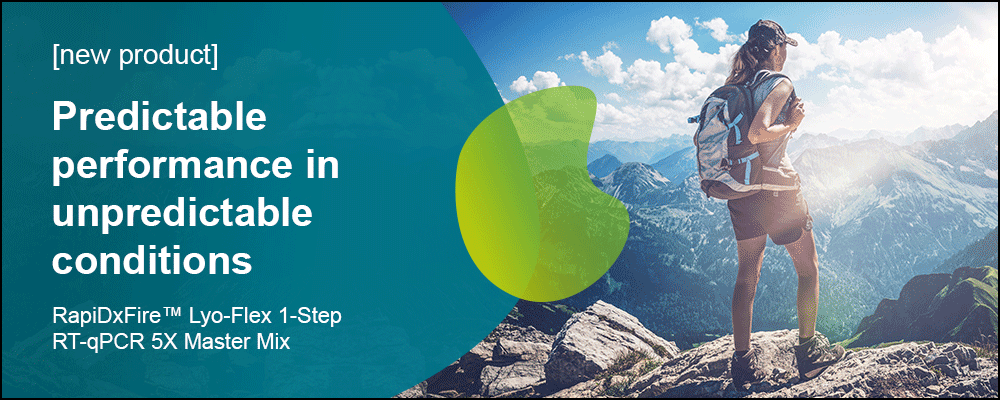Originally published : Mon, March 21, 2022 @ 9:06 PM
Updated : Wed, March 30, 2022 @ 4:00 PM
While both centralised and decentralised molecular diagnostics (MDx) testing models play an important role in patient healthcare, centralised testing offers great efficiency when testing a high volume of samples.
Many diagnostic labs drastically increased their capacity for reverse transcription quantitative PCR (RT-qPCR) during the COVID-19 pandemic to service mass PCR testing for SARS-CoV-2. As this testing winds down, these labs have an opportunity to refine and repurpose their RT-qPCR capacity, by performing more syndromic multiplex testing for pathogens for example.
For those looking to design new assays or optimise existing ones, selecting an RT-qPCR master mix that ensures high performance, simplicity and stability in automated workflows is key.
Here are some considerations for optimising RT-qPCR workflows:
![]() Use a 5x concentrated master mix
Use a 5x concentrated master mix
Using a concentrated master mix allows for higher test sensitivity by allowing a greater proportion of the PCR volume to be clinical sample. The 5x formulation also reduces the amount of packaging and requires less energy to ship and store the product, making it more environmentally friendly and cost-effective.
Thermostable enzymes
Some RNA templates can be tricky to work with, such as double stranded RNA viruses or those with a strong secondary structure that require high initial temperatures to denature. High reverse transcriptase thermostability enables cDNA synthesis to occur at higher temperatures, leading to greater target specificity and the ability to detect complex viruses.
Thermostability enables template denaturation to occur in the presence of the enzyme, avoiding a separate RNA destructuring step. It is also unnecessary to cool the lysate before adding it to the mix, saving time and another protocol step.

Heat-activated enzymes
Using a heat-activated reverse transcriptase and DNA polymerase enables room-temperature set-up and helps prevent non-specific, background amplification. Reagents and tests can be queued for loading on a platform deck for longer periods without risking invalid results.
 Single step protocol
Single step protocol
The simplicity of a one-tube, one-step RT-qPCR master mix eliminates an in-house pipetting step, which is typically the addition of an unstable reverse transcriptase to the final mix just prior to use. The removal of this step reduces the chance of contamination, errors and batch to batch variability. Crucially, in-house QC testing on the pre-combined master mix is significantly reduced since this is often handled by the component supplier.
![]() Detect both RNA and DNA templates
Detect both RNA and DNA templates
Selecting a single master mix containing a reverse transcriptase means the same master mix can be used for the detection of bacterial and DNA and RNA viral targets. This simplifies ordering and assay set-up.
Ensuring the master mix also contains an abundance of key PCR reaction components enables the detection of multiple pathogens in one reaction.
![]() Ditch the refrigeration dependency
Ditch the refrigeration dependency
While keeping precious test components cool is often essential, using a master mix that requires cool set-up creates a dependency on refrigerated equipment. Choosing a master mix with extended stability at room temperature removes the requirement for refrigerated compartments or plate hotels.
![]() Use the same master mix for random access testing
Use the same master mix for random access testing
For labs that also perform random access testing, choosing a lyophilisation-compatible master mix allows flexibility to use the same master mix for all workflows. This enables a reduction in costs through bulk purchasing and reduced waste.
By lyophilising assays using a lyo-compatible master mix, the reagents can be stored in the instrument at room temperature and reconstituted as needed.
Partner with a component supplier you can trust
Throughout the COVID-19 pandemic, LGC, Biosearch Technologies has served the diagnostic community as a reliable mission-critical component supplier for oligos, enzymes, sample preparation solutions and instruments.
Our RapiDxFire™ Lyo-Flex 1-Step RT-qPCR 5X Master Mix has been designed with input from top molecular diagnostic assay manufacturers to support assays requiring sensitive and reliable results. The master mix incorporates a unique heat-activated thermostable reverse transcriptase that enables robust cDNA synthesis at elevated temperatures and benchtop stability of fully assembled reactions for up to 8 hours.
To ensure high performance and stability in lab-based automated workflows, partner with us as you develop, optimise and evolve your molecular diagnostics to meet current and future infectious disease detection needs. 
Increase sensitivity and stability of your pathogen detection workflows


